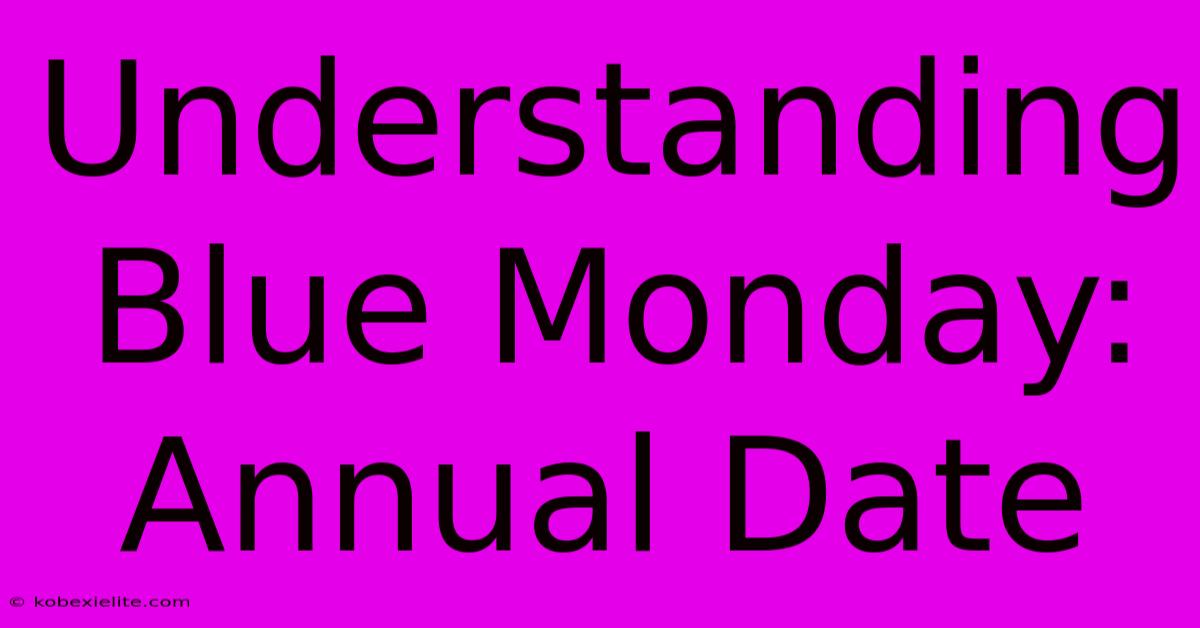Understanding Blue Monday: Annual Date

Discover more detailed and exciting information on our website. Click the link below to start your adventure: Visit Best Website mr.cleine.com. Don't miss out!
Table of Contents
Understanding Blue Monday: Annual Date
Blue Monday. You've probably heard the term, maybe even felt its supposed effects. But is it real? Let's delve into the origins, the science (or lack thereof), and the impact of this purportedly "most depressing day of the year."
What is Blue Monday?
Blue Monday is a date, typically falling in the third Monday of January, that's been marketed as the most depressing day of the year. It's not a formally recognized holiday or event; rather, it's a concept that originated from a PR stunt. It lacks scientific backing and is largely considered a marketing ploy.
The Origins of the "Most Depressing Day"
The term was coined in 2005 by psychologist Cliff Arnall, commissioned by a travel company. Arnall used a formula – a somewhat dubious concoction of factors including weather, debt, and motivational levels – to arrive at this specific date. The formula itself has been heavily criticized for its lack of rigor and scientific validity. Essentially, it was a clever marketing campaign designed to boost winter getaways.
The Science (or Lack Thereof) Behind Blue Monday
The scientific community overwhelmingly rejects the concept of Blue Monday. While January can be a challenging month for some due to post-holiday blues, shorter daylight hours, and financial strain, there's no evidence suggesting one specific day is inherently more depressing than others. Genuine seasonal affective disorder (SAD) affects individuals differently and doesn't conform to a single calendar date.
Factors Contributing to Winter Blues
Instead of focusing on the mythical Blue Monday, it's more productive to understand the actual factors contributing to feelings of sadness or low mood during the winter months:
- Seasonal Affective Disorder (SAD): A clinically recognized condition linked to reduced sunlight exposure.
- Post-Holiday Letdown: The excitement and social interaction of the holidays can lead to a feeling of emptiness afterward.
- Financial Strain: The expenses of the holiday season can contribute to stress and anxiety.
- Weather: Dark, cold weather can affect mood and energy levels.
Beyond the Hype: Addressing Winter Blues
Rather than obsessing over Blue Monday, it's crucial to address the real issues that can impact mental well-being during the winter. Here are some healthy coping mechanisms:
- Seek Sunlight: Even short periods of sunlight exposure can boost mood.
- Maintain a Healthy Lifestyle: Regular exercise, a balanced diet, and sufficient sleep are crucial for mental health.
- Connect with Others: Social interaction is vital for combating feelings of isolation.
- Practice Mindfulness: Techniques like meditation can help manage stress and anxiety.
- Seek Professional Help: If you're struggling with persistent feelings of sadness or low mood, don't hesitate to contact a mental health professional.
Conclusion: Debunking the Myth of Blue Monday
Blue Monday is a marketing invention, not a scientifically supported phenomenon. While the winter months can be challenging for many, focusing on genuine contributing factors and adopting healthy coping strategies is far more beneficial than subscribing to a manufactured date of gloom. Remember, your mental well-being matters year-round. Prioritize self-care and seek support when needed.
Keywords: Blue Monday, most depressing day, winter blues, seasonal affective disorder (SAD), mental health, coping mechanisms, January blues, post-holiday depression, marketing ploy, debunking myths, mental well-being, winter depression, sadness, low mood.

Thank you for visiting our website wich cover about Understanding Blue Monday: Annual Date. We hope the information provided has been useful to you. Feel free to contact us if you have any questions or need further assistance. See you next time and dont miss to bookmark.
Featured Posts
-
Ipswich Town Vs Manchester City Match Report
Jan 20, 2025
-
Eighth Meeting Alcaraz Djokovic
Jan 20, 2025
-
Smith Set For 50th West Ham Wsl Game
Jan 20, 2025
-
Draper On Bodys Strength Gains
Jan 20, 2025
-
Wordle Solution Jan 20 1311 Hints
Jan 20, 2025
